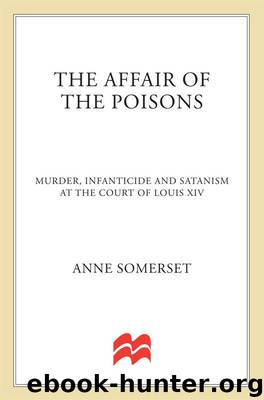The Affair of the Poisons: Murder, Infanticide, and Satanism at the Court of Louis XIV by Somerset Anne

Author:Somerset, Anne [Somerset, Anne]
Language: eng
Format: mobi, azw3, epub
Publisher: St. Martin's Press
Published: 2014-01-13T23:00:00+00:00
SEVEN
A COURT IN CHAOS
There were many people who believed that in 1670 the King’s English sister-in-law, Henriette-Anne, Duchesse d’Orléans, had been killed by poison. Her death had been officially ascribed to natural causes, but the distressing nature of her final hours, during which she herself declared she had been poisoned, ensured that this verdict had been received with widespread scepticism. It is impossible to know the King’s views on the matter. He certainly professed to accept the doctors’ findings but he may still have experienced occasional nagging doubts that poison had been involved. However much he tried to dismiss such fears, it would be understandable if the incident had made him more receptive to the idea that poison plots could pose a risk even to members of the royal family.
Henriette-Anne was aged only twenty-six at the time of her death. Married in 1661 to the King’s younger brother ‘Monsieur’, she was on very bad terms with her homosexual husband, who blamed her for the banishment of his favourite, the Chevalier de Lorraine, and was jealous of the fact that the King was using her as an intermediary to forge closer links with England. She had been in ill health for some time (the Duchesse de Montpensier said that in the weeks before her death she looked like a corpse with rouged cheeks) but even so, the suddenness and speed of the attack which carried her off meant that her demise came as a terrible shock to the court.
Shortly after drinking a cup of chicory water on the evening of 29 June 1670 Henriette-Anne had suddenly clutched at her side and collapsed in agony.1 Having been helped to her bed she lay there in terrible pain, repeatedly insisting that she had been poisoned. The devoted lady-in-waiting who had prepared the chicory water protested that she had drunk some herself without ill effect while Monsieur (who appeared as alarmed as everyone else and who betrayed no signs of guilt) demanded that some of the liquid should be tested on a dog to see if it was harmful. The physicians summoned to treat Madame stubbornly maintained that she was merely suffering from colic and gave her purgatives and emetics. They also administered oil to settle her stomach and various other dubious remedies such as powder of vipers. Despite their efforts Madame’s pains did not lessen and as she grew steadily weaker it became apparent that she would not survive the night. Towards midnight the King had an emotional last meeting with her, bidding her farewell with tears in his eyes. Subsequently the English ambassador came to her bedside and asked her directly if she still thought she had been poisoned. At this the confessor who was in attendance sharply intervened, urging, ‘Madame, accuse no person but make your death an offering of sacrifice to God.’ Dutifully Madame ‘made no other answer than by shrugging up her shoulders’, but this hardly allayed the ambassador’s suspicions.2 Only with her death in the early hours of the morning of 30 June did Madame’s torment finally cease.
Download
The Affair of the Poisons: Murder, Infanticide, and Satanism at the Court of Louis XIV by Somerset Anne.azw3
The Affair of the Poisons: Murder, Infanticide, and Satanism at the Court of Louis XIV by Somerset Anne.epub
This site does not store any files on its server. We only index and link to content provided by other sites. Please contact the content providers to delete copyright contents if any and email us, we'll remove relevant links or contents immediately.
| Africa | Americas |
| Arctic & Antarctica | Asia |
| Australia & Oceania | Europe |
| Middle East | Russia |
| United States | World |
| Ancient Civilizations | Military |
| Historical Study & Educational Resources |
The Crown by Robert Lacey(4113)
Room 212 by Kate Stewart(4112)
Endurance: Shackleton's Incredible Voyage by Alfred Lansing(3852)
The Iron Duke by The Iron Duke(3649)
The Rape of Nanking by Iris Chang(3525)
Killing England by Bill O'Reilly(3459)
Joan of Arc by Mary Gordon(3264)
Say Nothing by Patrick Radden Keefe(3068)
I'll Give You the Sun by Jandy Nelson(2845)
Hitler's Monsters by Eric Kurlander(2736)
Shadow of Night by Deborah Harkness(2724)
Margaret Thatcher: The Autobiography by Thatcher Margaret(2688)
Mary, Queen of Scots, and the Murder of Lord Darnley by Alison Weir(2680)
Darkest Hour by Anthony McCarten(2650)
Blood and Sand by Alex Von Tunzelmann(2611)
Red Famine: Stalin's War on Ukraine by Anne Applebaum(2468)
Eleanor & Park by Rainbow Rowell(2398)
The One Memory of Flora Banks by Emily Barr(2350)
Book of Life by Deborah Harkness(2269)
